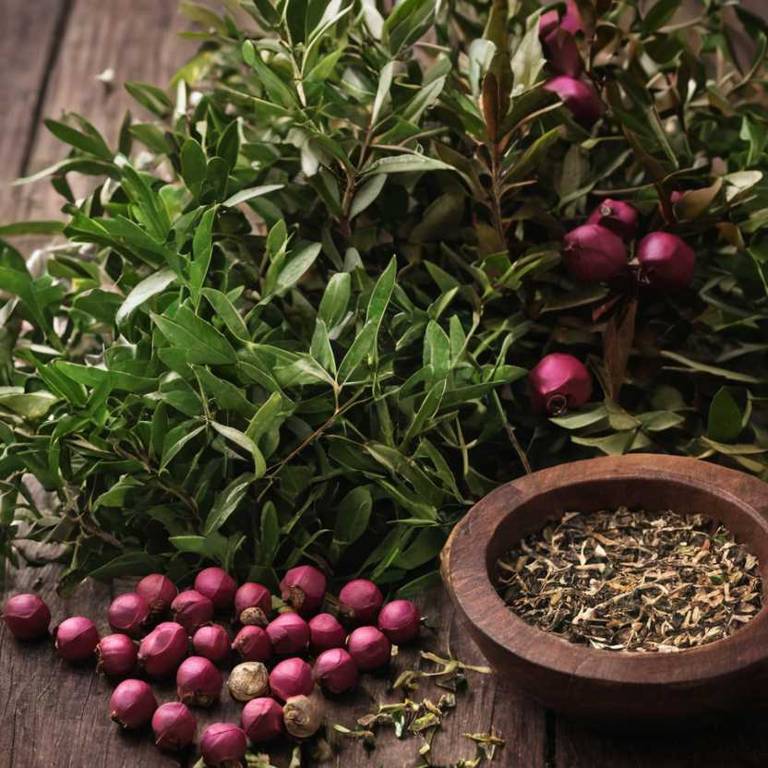Cloves (Syzygium aromaticum)
Cloves (Syzygium aromaticum) is a member of the Myrtaceae family, native to Maluku Islands, Indonesia, Northern Australia, and Southeast Asia. Traditionally, its fruits, resin, and bark have been used for infusions, decoctions, and culinary uses.
This herb is particularly valued for its anti-inflammatory, tonic, and astringent actions, and has a long history of use in traditional chinese medicine, ayurvedic medicine, and european herbal medicine.

Quick Facts / Key Information
| Common Name | Cloves |
|---|---|
| Scientific Name | Syzygium aromaticum |
| Plant Family | Myrtaceae |
| Genus | Syzygium |
| Species | aromaticum |
| Native Range | Maluku Islands, Indonesia, Northern Australia, Southeast Asia |
| Plant Parts Used | Fruits, Resin, Bark |
| Primary Medicinal Actions | Anti-Inflammatory, Tonic, Astringent |
| Primary Traditional Systems | Traditional Chinese Medicine, Ayurvedic Medicine, European Herbal Medicine |
| Historical Preparation Methods | Infusion, Decoction, Culinary Use |
Botanical Identity
- Scientific Name
- Syzygium aromaticum
- Common Name
- Cloves
- Synonyms / Alternative Names
- Syzygium, Clove Bud, Kapikacup
- Plant Family
- Myrtaceae
- Genus
- Syzygium
Botanical Description
- Growth Habit
- Perennial herbaceous plant.
- Height
- It typically grows to a height of 5 to 10 meters.
- Leaves
- Simple leaves with entire margins, upper surface dark green, lower surface pale green, bearing stomatal bands along the midrib.
- Flowers
- Bilaterally symmetrical flowers with four petals, two of which are larger and showy, arranged in clusters, with reddish-purple to brownish coloration.
- Stems
- Woody, aromatic, quadrangular, branched, with opposite, persistent, glandular hairs.
Traditional Uses / Historical Use
Traditional Systems
- Traditional Chinese Medicine
- Ayurvedic Medicine
- European Herbal Medicine
- Japanese Kampo Medicine
Historical Preparation Methods
- Infusion
- Decoction
- Culinary Use
- Powder
Medicinal Actions
- Anti-inflammatory
- In herbal literature, noted as a calming anti-inflammatory, in inflammation-focused discussions.
- Tonic
- In herbal texts, considered a warming tonic, for foundational support.
- Astringent
- Commonly referenced as a cooling astringent, in structural-support contexts.
- Carminative
- Traditionally described as a mild carminative, for digestive process support.
Active Compounds
- Essential Oil
- Naturally occurring plant oils composed primarily of volatile constituents.
- Terpenoid
- Naturally occurring metabolites widely distributed in leaves, flowers, and roots.
- Flavonoid
- A group of naturally occurring compounds commonly present in many flowering plants.
- Phenolic Acid
- A class of aromatic plant compounds commonly found in leaves, seeds, and stems.
Modern Research Overview
Contemporary research on this plant includes areas such as chemical analysis, laboratory-based studies, and observational research. Detailed summaries of published findings are not included at this stage and will be added during future content updates.
Safety & Contraindications
- General Precautions
- Some general precautions have been associated with the use of this herb.
- Contraindications
- Reported information suggests that this herb may be contraindicated in specific circumstances.
- Allergies
- Information regarding allergic responses to this herb is limited.
- Drug Interactions
- There is insufficient evidence to determine whether this herb interacts with pharmaceutical drugs.
- Toxicity
- Toxic effects associated with this herb have not been well documented.
- Pregnancy & Breastfeeding
- Safety during pregnancy and breastfeeding has not been well documented.
Preparation & Usage Methods
- Infusion
- Infusions are commonly prepared using hot water to release aromatic and soluble components.
- Decoction
- Plant parts are gently boiled in water to release soluble constituents.
- Poultice
- This method uses direct contact between plant material and the skin.
- Culinary Use
- Culinary use includes adding plant material to recipes or beverages.
- Capsule
- Capsules provide a standardized way to consume powdered plant material.
Growing, Harvesting & Storage
Growing / Cultivation
- Soil
- Prefers loamy soil with well-drained conditions. Typically grows best in nutrient-rich soils.
- Sunlight
- Thrives in full sun. Tolerates full sun to partial shade.
- Watering
- Prefers well-balanced moisture levels. Tolerates moderate moisture fluctuations.
Medical Disclaimer
The information provided on this page is for educational and informational purposes only. It is not intended to diagnose, treat, cure, or prevent any medical condition. Always consult a qualified healthcare professional before using any herb for medicinal purposes.